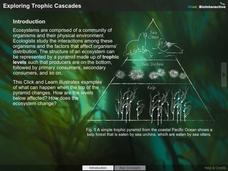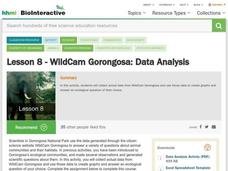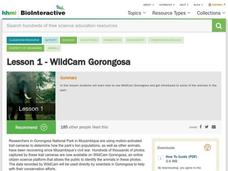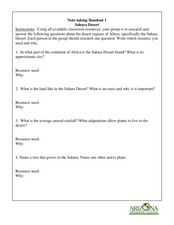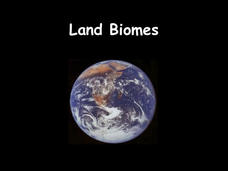Cheetah Outreach
Habitats
Explore six different habitats—wetlands, rainforest, savannah, desert, city, and cultivated land—to determine which habitat factors (food, water, shelter, and space) are high, medium, or low in each. Learners also use maps of Africa to...
Howard Hughes Medical Institute
Exploring Trophic Cascades
What happens when the top predator on an ecosystem disappears? Scholars explore this idea through an introduction example and four case studies. They learn to analyze the importance of every member in a food pyramid to come to their...
Howard Hughes Medical Institute
BiomeViewer
Which holds more influence, the environment over humans or humans over the environment? Young scientists explore an online interactive that addresses this discussion. They observe changes in the natural world over time and see which...
Howard Hughes Medical Institute
Scientific Inquiry Using WildCam Gorongosa
How do scientists determine what questions to ask to meet their research goals? Help your class develop an inquiry mindset with a lesson based on studies in the Gorongosa National Park. Partners create their own research questions by...
Howard Hughes Medical Institute
Measuring Biodiversity in Gorongosa
Take your biology class' understanding of biodiversity to a whole new level! Ecology scholars use data to calculate three different diversity indices based on the organisms in the Gorongosa National Park. The four-part activity uses an...
Howard Hughes Medical Institute
Gorongosa: Scientific Inquiry and Data Analysis
How does the scientific process begin? Introduce ecology scholars to scientific inquiry through an insightful, data-driven lesson. Partners examine data from an ongoing research study to determine the questions it answers. The resource...
Howard Hughes Medical Institute
Lesson 7: Observations Across Habitats
How are animals in separate but nearby habitats related? Ecology scholars compare the animal inhabitants of the Gorongosa National Park in part seven of an eight-part series. Learners study photos from two different habitats, then...
Howard Hughes Medical Institute
Lesson 8: WildCam Gorongosa Data Analysis
How do scientists analyze data to get a specific answer to a question? The final chapter in an eight-part series of activities centered around Gorongosa National Park encourages scholars to dig deeper into the scientific process. After...
Howard Hughes Medical Institute
Lesson 5: Tracking Lion Communities
Researchers in Gorongosa National Park placed cameras there many years ago to understand what was happening with the lion communities that lived there. Little did they know, they opened a door to so much more! Inquisitive...
Howard Hughes Medical Institute
Lesson 2: Gorongosa National Park
How has Gorongosa National Park changed over time? Discover the park's rich history, dating back to primitive human times, through an interactive timeline and scientific reading. The second installment in an eight-part series explores...
Howard Hughes Medical Institute
Lesson 1: WildCam Gorongosa
Take a walk on the wild side! Episode one of an eight-part series of interactive lessons regarding Gorongosa National Park invites learners to become a part of the citizen science community. Scholars read a brief overview of the trail...
Curated OER
Note-Taking Handout 1: Sahara Desert
In this research skills worksheet, learners collect information about the desert regions, savanna regions, and rainforest regions of Africa and then respond to 7 questions about each of the regions. Students then compare the regions...
Curated OER
Ecosystem Interactions Web
Students pick an ecosystem (forest, desert, coral reef, open ocean, grassland, mountain, savanna, etc.) and design an interaction web for their chosen ecosystem. Each group shares their ecosystem's web of life with the class.
Curated OER
The Cultures of Africa
Second graders study the people of Africa, the animals of Africa, and the customs and traditions of the African people. Song and dance are a central part of the African culture, therefore the focus is primarily on those two aspects. They...
Curated OER
A Brief History of Life: How Did Everything Begin?
Addressing the idea of intelligent design, as well as a number of creation myths, this presentation gives a measured and scientific perspective to the beginning of the world. It includes a graphic on the Big Bang Theory, evolution, and...
McGraw Hill
Determine the Meaning of Words and Phrases
Work on using context clues in your social studies class. Pupils read a brief selection about the terrain in Senegal and define each of the underlined words in the space provided. They also list the context clues that helped them...
Howard Hughes Medical Institute
The Great Elephant Census Modeling Activity
They say elephants never forget—and your class won't forget an insightful modeling activity either! Junior zoologists take part in a mock elephant census using the sample count and total count methods. The included materials provide...
Curated OER
Am I Taller than an Antelope
Students investigate biology by examining body sizes of different animals. In this antelope measurement lesson, students research the physicality of Antelopes and other large animals that inhabit Earth. Students create a model Antelope...
California Academy of Science
Poetic Reflections
Poetry is a wonderful way to explore language, express topical understanding, and incite creative thinking. After a trip to the local natural history museum (or zoo), learners write an acrostic or a cinquain poem describing one of their...
It's About Time
Present-Day Climate in Your Community
So what exactly is climate? This first installment of a six-part series introduces the concept of climate using real-world data tables and topographic maps. The timely lesson includes a comprehensive overview of climate, as well as...
Concord Consortium
Cheetah's Lunch
Run like a cheetah. A performance task challenges pupils to solve several different problems involving the speed of a cheetah. Given information for scenarios where the cheetah chases its prey, they determine if the big cat is fast enough.
Biology Junction
Land Biomes
Biomes share similar climates and ecosystems, despite being separated geographically on the planet. A presentation introduces the six most common land biomes. It focuses on the commonalities in climate, plants, and animals with many...
Curated OER
Counting Worksheet - African Animals
In this counting practice learning exercise, 1st graders study the number of animals in each box and then write the total number of African animals in the space.
Curated OER
Africa - Clothing
Third graders discuss the differences between the clothing choices within the three regions in Africa and in Hawaii.
Other popular searches
- African Savanna
- Savannah
- African Savannahs
- Ecology African Savanna
- African Savannah Animals
- African Savanna Animals
- Savannas Geography
- African Savanna Food Chains
- Savannas Names
- Climatogram Savannas
- Tropical Savannas
- Biome for Tropical Savannas



